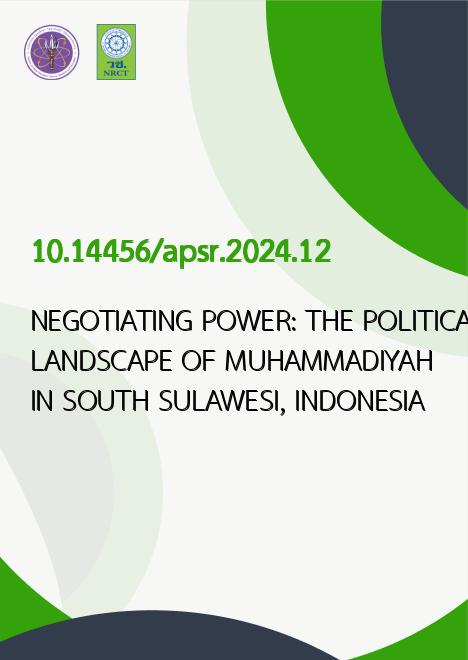
|
NEGOTIATING POWER: THE POLITICAL LANDSCAPE OF MUHAMMADIYAH IN SOUTH SULAWESI, INDONESIA |
|---|---|
| รหัสดีโอไอ | |
| Creator | Tosaporn MAHAMUD |
| Title | NEGOTIATING POWER: THE POLITICAL LANDSCAPE OF MUHAMMADIYAH IN SOUTH SULAWESI, INDONESIA |
| Contributor | Ismail Suardi WEKKE, Andi Fiptar Abdi ALAM, Angga Pratama SYAMSUDDIN, Mohamed Ahmed DAWABSHEH |
| Publisher | Asian Political Science Review |
| Publication Year | 2567 |
| Journal Title | Asian Political Science Review |
| Journal Vol. | 8 |
| Journal No. | 2 |
| Page no. | 17–27 |
| Keyword | Muhammadiyah, Political Islam, Indonesia, South Sulawesi, Political Participation |
| URL Website | https://so01.tci-thaijo.org/index.php/APSR |
| Website title | https://so01.tci-thaijo.org/index.php/APSR/article/view/273206 |
| ISSN | 2730-3624 |
| Abstract | This article aims to unveil the multifaceted elements that shape Muhammadiyah's distinctive political experience in South Sulawesi. Our analysis explores the historical context, meticulously examining Muhammadiyah's early interactions with colonial and post-colonial governments in South Sulawesi. We will dissect how these interactions informed the organization's evolving approach to political participation, shaped by the need to navigate the complexities of the colonial landscape and the subsequent jostling for power in the promising Indonesian republic in the context of 2024 election. The organization's internal dynamics, particularly its perspectives on Islamic political participation, will also be meticulously explored. We will unveil the various interpretations within Muhammadiyah regarding the role of Islam in the public sphere and how these interpretations influence the organization's engagement with political parties, elections, and policy advocacy. Finally, we will meticulously analyze the specific ways in which Muhammadiyah negotiates its power within South Sulawesi's contemporary political landscape. By meticulously examining these historical, internal, and contemporary factors, this study aspires to illuminate the multifaceted relationship between Muhammadiyah and politics in a crucial Indonesian region. This will provide a deeper understanding of how a prominent Islamic organization like Muhammadiyah shapes and is shaped by the intricate political forces at play within a specific regional context. |